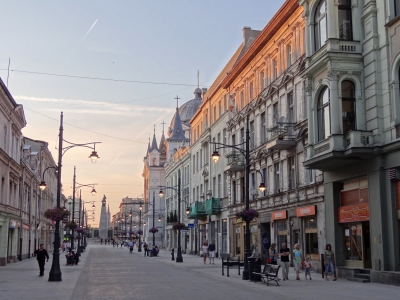In mid-1981, amid a widespread economic crisis and food shortages in the Polish People's Republic, thousands of Poles, mainly women and their children, took part in several hunger demonstrations, organized in cities and towns across the country. The protests were peaceful, without rioting, and the biggest one took place on 30 July 1981 in d. The situation in Communist Poland was serious enough that it prompted Adam Michnik to write, "Poland faces hunger uprisings".
Łódź, also rendered in English as Lodz, is the third largest city in Poland and a former industrial centre. Located in the central part of the country, it has a population of 672,185 (2020). It is the capital of Łódź Voivodeship, and is located approximately 120 km (75 mi) south-west of Warsaw. The city's coat of arms is an example of canting, as it depicts a boat (łódź in Polish), which alludes to the city's name.
Łódź was once a small settlement that first appeared in 14th-century records. It was granted town rights in 1423 by Polish King Władysław II Jagiełło and it remained a private town of the Kuyavian bishops and clergy until the late 18th century. The Second Industrial Revolution brought rapid growth in textile manufacturing and in population owing to the inflow of migrants, notably Germans and Jews. Ever since the industrialization of the area the city has struggled with multinationalism and social inequalities, as documented in the novel The Promised Land by Nobel Prize-winning author Władysław Reymont. The contrasts greatly reflected on the architecture of the city, where luxurious mansions coexisted with red-brick factories and dilapidated tenement houses.The industrial development and demographic surge made Łódź one of the largest cities in Poland. Under the German occupation during World War II Łódź was briefly renamed Litzmannstadt in honour of Karl Litzmann. The city's large Jewish population was forced into a walled zone known as the Łódź Ghetto, from where they were sent to German concentration and extermination camps. The city became Poland's temporary seat of power in 1945.
Łódź experienced a sharp demographic and economic decline after 1989. It was only in the 2010s that the city began to experience revitalization of its neglected downtown area. Łódź is ranked by the Globalization and World Cities Research Network on the “Sufficiency” level of global influence and is internationally known for its National Film School, a cradle for the most renowned Polish actors and directors, including Andrzej Wajda and Roman Polanski. In 2017, the city was inducted into the UNESCO Creative Cities Network and named UNESCO City of Film.

1981Jul, 30
As many as 50,000 demonstrators, mostly women and children, took to the streets in Łódź to protest food ration shortages in Communist Poland.
Choose Another Date
Events on 1981
- 20Jan
Iran hostage crisis
Twenty minutes after Ronald Reagan was inaugurated, Iran releases 52 American hostages. - 27Apr
Computer mouse
Xerox PARC introduces the computer mouse. - 27Jun
Mao Zedong
The Central Committee of the Communist Party of China issues its "Resolution on Certain Questions in the History of Our Party Since the Founding of the People's Republic of China", laying the blame for the Cultural Revolution on Mao Zedong. - 7Jul
Sandra Day O'Connor
U.S. President Ronald Reagan appoints Sandra Day O'Connor to become the first female member of the Supreme Court of the United States. - 15Sep
Sandra Day O'Connor
The Senate Judiciary Committee unanimously approves Sandra Day O'Connor to become the first female justice of the Supreme Court of the United States

 English
English  español
español  français
français  português
português  русский
русский  العربية
العربية  简体中文
简体中文 